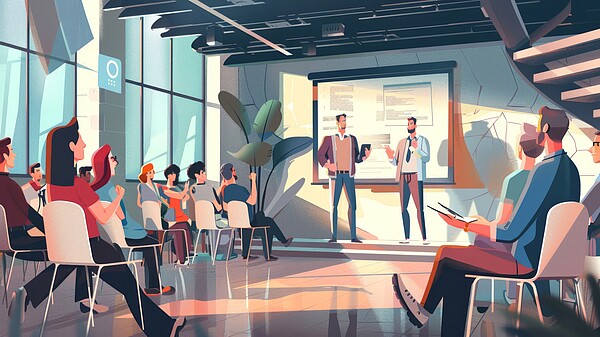For The Common Good In Berlin
Berlin is not only good for profits. Berlin is good for nonprofits too.
Have you ever considered getting together with some like-minded people in order to get something done? Something with social impact. Something grassroots to benefit your local community? Or something big, to make the whole world a better place!
Nonprofits are pools of intrinsic motivation and the energy and passions of people with a cause. For many nonprofits and NGOs, location is a significant factor.
There are nigh on a thousand nonprofits in Berlin. Many of these are neighborhood initiatives with local interests and reach, but several of the country’s largest organizations also have their headquarters in the capital.
Many of these organizations live largely from the good will of their supporters and rely on donations. Germans are happy to give to a good cause, be it humanitarian, disaster relief, health, conservation and nature, poverty, or something else entirely. According to statista, €5,77B were donated in 2021.
Some of the biggest organizations in terms of donations are headquartered in Berlin. For instance:
- the German section of Médecins Sans Frontières / Doctors Without Borders
- German humanitarian organization Johanniter-Unfall-Hilfe
- World Wildlife Fund (WWF) Germany
- the German Red Cross
- Save the Children Germany
- Amnesty International Germany
- Oxfam Germany
- German nature conservation organization NABU (Naturschutzbund)
- conservation organization BUND (Bund für Umwelt und Naturschutz Deutschland) Friends of the Earth
The reason that internationally active non-profits choose Berlin for their German HQ is relatively clear: to be close to the decision-makers. The best nonprofits, after all, don’t just treat the symptoms but try to get at the causes of societal problems, and are therefore a sort of counterweight to the lobbying efforts of big business and industry.
Prominent international CSR initiatives and foundations also set up offices in Berlin in recent years, such as:
- George Soros’ Open Society Foundations
- the Bill and Melinda Gates Foundation
- the Wellcome trust’s government relations Europe team
While some established German and international organizations are still based in Bonn, the erstwhile capital of western Germany (the Small Town In Germany of le Carré’s novel), many followed the government when Berlin became the seat of parliament in 1999.
The World Health Organization WHO has a hub for pandemic and epidemic intelligence in Berlin with the mission to provide the world with better data, analytics and decisions to detect and respond to health emergencies. The WHO Hub is currently operating from a center provided by the Charité - University Medicine Berlin.
The Nonprofit Sector in Berlin
When one speaks of nonprofits, one thinks of registered associations like the ones listed above. In Germany they typically carry the e.V. after their name, indicating that they are registered ‘clubs’ or associations. However, officially recognized nonprofits can also be foundations (Stiftung), or even a form of limited company for the common good (gGmbH). Furthermore, political parties count as nonprofits, and so do unions. The Confederation of German Trade Unions DGB, for instance, has its headquarters in Berlin.
Because national tax regulations differ, international organizations usually have a single legal entity in each country. On the other hand, several massive and well-known German organizations have complex substructures. The Red Cross, BUND Friends of the Earth, or Tafel Deutschland (who give food to the homeless) have many, many small regional and local entities. The nonprofit organization for workers’ interests and welfare Arbeiterwohlfahrt (AWO) has about 13,000 facilities and services in Germany. Such local centers are often run on the ground by volunteers – but the mothership is in Berlin.
Volunteers notwithstanding, nonprofits can be sizable employers. Diakonie Deutschland, one of the biggest nonprofit organizations in Berlin, has almost 600,000 employees worldwide, AWO approximately 230,000 in Germany, and the German Red Cross about 180,000.
As in any sector, there are particular circumstances and requirements that demand specialized tools or services. When it comes to the service industry supplying the nonprofit sector, Berlin is a good place to be. Agencies such as fuchs+wald or Kaiserwetter have experience working with nonprofits, and consultants such as Pluralog are specialized. Also marketing tool providers Getunik or the peer-to-peer fundraising platform Betterplace are based in Berlin.
The German Fundraising Association DFRV, itself a Berlin-based nonprofit, looks after the interests of nonprofits. They also arrange the German Fundraising Congress, which took place once again in Berlin in late September 2022.
The German institute for social matters DZI, naturally based in Berlin, keeps an eye on the scene. Organizations can apply for the DZI label, which proves to donors that they have been vetted for what they do with their donations. 57 Berlin organizations carry this seal.
Unlike in other countries, there has been very little sensationalist media scandalizing about misbehavior in Germany. All in all, nonprofits enjoy high standing and great trust in German society.
Of course NGOs that want to move to Berlin receive the free support of the business development agency Berlin Partner, just like any other company.
Text: Olaf Bryan Wielk, ideenmanufaktur
Header image: © pexels.com






